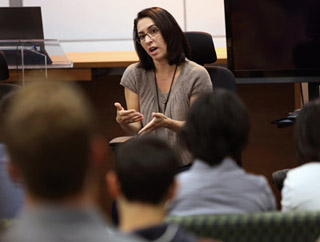
The Hispanic Engineer National Achievement Awards Corp. (HENAAC) recently named Katherine Guzman (8114) one of its 2013 Luminary honorees. She will receive her award on Friday, Oct. 5, at the 25th Anniversary HENAAC Conference in New Orleans.
“This is an incredible honor,” says Katherine. “I remember going to the HENAAC awards ceremony as an undergraduate and looking up at the award winners with awe, never imagining that one day I might be considered for such an award.”
Luminary honorees represent professionals in science, technology, engineering, and mathematics who initiate, collaborate, and lead
key programs and research in their companies. These individuals have made significant contributions to the Hispanic technical community as leaders and role models.
“Dr. Guzman truly embodies our core values,” says Todd West (8114), Katherine’s former manager. “She consistently executes and leads high-quality work in the face of sometimes challenging and ambiguous environments. She manages effective teams and fosters an attitude of mutual respect. Her outreach activities are equally exemplary. In short, Dr. Guzman is an ideal role model for others considering a career in science, technology, engineering, or math.”
Creating new tools
At Sandia, Katherine has distinguished herself with her work in the area of risk management. She played a key role in the development of SUMMIT (Standard Unified Modeling, Mapping, and Integration Toolkit), a new technology to enable emergency management personnel — emergency responders and decision makers — to seamlessly access information from diverse models and data coming from different sources. The creation of these tools is now enabling the Department of Homeland Security (DHS) to rigorously plan for and exercise against highly complex disaster scenarios, including detonation of an improvised explosive device in a major metropolitan area, a major earthquake in regions with multiple intersections with critical infrastructure, and a national-level cyberattack.
Katherine is now leading a Sandia effort to define new risk assessments for DHS, work that could shape the way the nation understands and attempts to mitigate the risk of terrorist attacks. The goal is to create risk assessment methodology that is simple and transparent, yet defensible scientifically. This work must effectively bridge the gap between academic risk management theory and the practical problem of national security risk management. One challenge is addressing a complex problem in a meaningful manner to decision-makers.
Service and science
Katherine says science was part of her upbringing. “My father is a scientist and he raised me and my sisters the way he was raised — to ask a lot of questions,” she says. “He spent a lot of time explaining to us the how and why of everything.”
Her future in mechanical engineering became apparent at a young age. “I was always more interested in building furniture for my dolls than playing with the dolls themselves,” says Katherine. “Making things was what
fascinated me.”
As a college student at the University of Texas at Austin, Katherine took the opportunity to study abroad in Peru, her mother’s native country. Her parents met when her dad was a Peace Corps volunteer in Peru, so her mother moved to the United States as an adult. “This was a chance for me to connect with my mother’s family and really understand where she came from,” says Katherine.
Katherine earned her PhD in mechanical engineering at the University of California, Berkeley. As both an undergraduate and graduate student, she found herself one of few women and even fewer
Hispanic women.
When it came time to consider where to begin her career, service was at the front of Katherine’s mind. “My father served in the Peace Corps and my mother was a social worker, so I was raised with a very keen sense of making a contribution to the world,” she says. “My dad is an agronomist and he felt that he, as part of a large community of scientists, was helping to solve world hunger through his work. That’s a pretty noble cause to go to work for every day. So coming to Sandia was a natural choice because our work has true national impact.”
One of the things Katherine loves about her work at Sandia is that there is no perfect solution to the problems she is trying to solve. “Managing risk is a really tough problem and I enjoy wrestling with that,” she explains. “I enjoy the stimulating discussions as I work with colleagues to pick apart the problem and chip away at it. I find this very fulfilling.”
Katherine is also driven by a personal passion to help minorities and women in science and engineering achieve their career dreams. As an undergraduate and graduate engineering student at two of the country’s largest and most prestigious universities, she encountered very few female and minority role models and virtually no female minority role models. That is something she hopes to change with her work as a leader, mentor, and keynote speaker.
A role model in the community
“Katherine is a role model within both the Hispanic and women in engineering communities, at local, regional and national levels,” says Peter Davies (6200), director of Nuclear Energy and Fuel Cell Programs. He worked closely with Katherine in his previous role as director of Homeland Security and Defense Systems Center 8100.
Outside of work, Katherine stays busy with her husband and two young sons. As a family, they enjoy camping, nature, and baseball. Over the past summer, they hit a number of major league ballparks — the San Francisco Giants and Oakland A’s, naturally, along with the LA Dodgers, San Diego Padres, Chicago Cubs, and St. Louis Cardinals.
“Balancing work with family and community is important to me,” says Katherine. “I want to instill in my sons the values I was raised with — hard work, the value of education, the importance of community, and respect for everyone.”